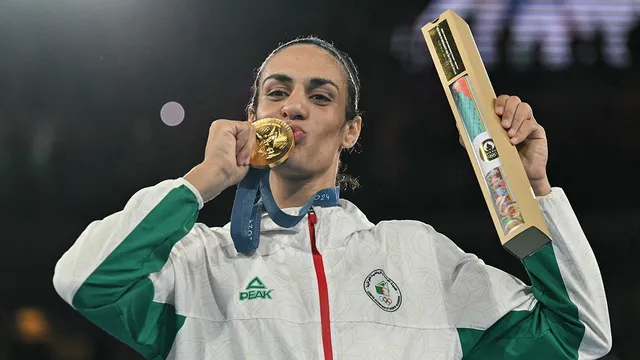
Imane Khelif sparks controversy after Olympic rule changes threaten medal
2025-07-03 14:05- The International Olympic Committee introduced new rules mandating gender tests for female athletes ahead of the 2028 Olympics.
- Imane Khelif, who won gold in women's boxing during the 2024 Olympics, previously faced scrutiny after failing a gender test.
- The situation has reignited discussions on fairness in women's sports, with calls for Khelif to potentially lose her Olympic medal.
Express your sentiment!
Insights
In Algeria, the International Olympic Committee (IOC) announced changes to the rules governing female athletes, particularly regarding gender tests that will be mandatory for the 2028 Olympics. Imane Khelif, a boxer who won gold in the women's division during the 2024 Paris Olympics, has been at the center of a significant controversy regarding gender eligibility. Following a failed gender test prior to the 2023 World Championships, Khelif's ability to participate in the Olympics was questioned, although she was ultimately able to compete. This contentious situation arose because the International Boxing Association (IBA), which administered the test, was stripped of its qualification responsibilities for the upcoming Olympic event. The new regulations stipulate that all athletes over the age of 18 participating in World Boxing competitions must undergo a genetic test to confirm their sex at birth. This decision was sparked by the calls for stricter guidelines concerning transgender athletes competing in female categories to ensure fairness in sports, as emphasized by the new IOC president, Kirsty Coventry, during her recent statements. A PCR genetic test will be used to analyze chromosomal material, indicating whether an athlete may be classified as male, regardless of personal declarations. Khelif expressed her dissatisfaction with these developments through social media, posting a quote from Winston Churchill regarding success and perseverance, which many perceived as a critique of the IOC's actions. The changes, along with Khelif's controversial history, have led to renewed discussions about the integrity of women's sports and the inclusion of transgender athletes. Participants in the Olympic Games, such as Khelif, may find themselves subject to further scrutiny as the implementation of these rules approaches, particularly with persistent calls from some factions to remove Khelif's Olympic gold. The ongoing debates surrounding these new regulations and Khelif's situation highlight the complexity of gender identity in sports and the increasingly polarized opinions on how to handle such matters. As these rules evolve, the landscapes of women's sports and the Olympics will likely continue to be contentious arenas for discussion and dissent, with Khelif's case serving as a pivotal example of the challenges and controversies faced by athletes navigating these new policies.
Contexts
The impact of International Olympic Committee (IOC) rule changes on female athletes is multifaceted, encompassing issues of fairness, inclusivity, and the advancement of women in sports. Over the past few years, the IOC has made several adjustments to its regulations that affect female athletes directly. These changes are primarily aimed at ensuring that female athletes have equal opportunities to compete and succeed at the highest levels while striving to maintain the integrity of competition. Important among these changes has been the refinement of eligibility criteria for transgender athletes, which has stirred considerable debate. The introduction of clearer guidelines has encouraged participation while attempting to alleviate concerns regarding competitive advantage. However, the continued evolution of these rules requires ongoing monitoring and assessment to ensure they do not inadvertently disadvantage other female competitors. In addition to the adjustments concerning transgender athletes, the IOC has implemented measures promoting gender equality within sports governance. This includes mandates for female representation on Olympic organizing committees and encouraging National Olympic Committees to adopt similar policies. As a result, more women are stepping into leadership positions within sporting organizations, which can lead to more equitable decision-making and policies that impact female athletes. By promoting greater diversity in leadership roles, the IOC is acknowledging the importance of women's voices in shaping the future of sports. This initiative not only empowers women but also serves as a beacon for future generations of female athletes, inspiring them to pursue careers in sports, both as competitors and in administrative roles. Despite these positive strides, challenges persist within the realm of sports that the IOC must address. The financial implications of attending the Olympics and the disparities in funding between male and female sports remain significant obstacles. Many female athletes struggle to secure adequate sponsorships compared to their male counterparts, which can affect their training, competition readiness, and overall career progression. The IOC and other stakeholders need to develop strategies to counteract these disparities by promoting women's events and securing sponsorships that recognize the value female athletes bring to the sports world. Addressing economic disparities is crucial for the long-term sustainability of female sports and the development of talent. The impact of IOC rule changes on female athletes is a complex interplay of progress and challenges. While strides towards inclusivity have been made, additional efforts are necessary to achieve true equality. It is imperative for the IOC to continually assess the implications of its policies on female athletes and adapt them to meet the evolving landscape of sports. Gender equality in sports is not just a moral imperative but a necessary evolution that will benefit all athletes, regardless of gender. As we move forward, the focus should remain on ensuring that women have a voice in these changes, and that the support structures needed for their success are firmly in place.